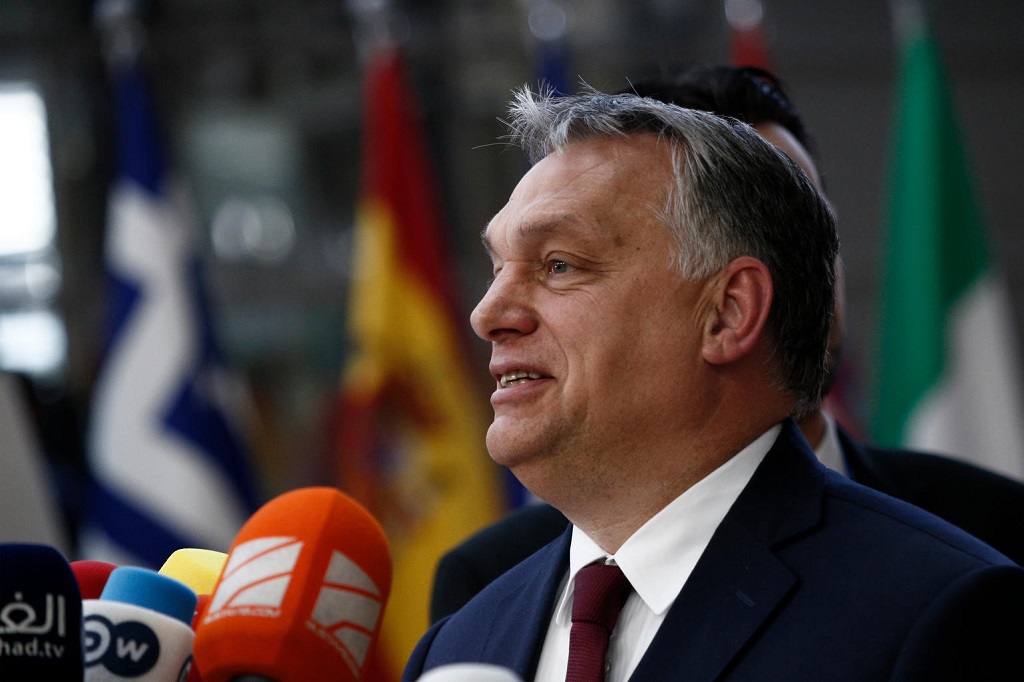Meat-cleaver economic nationalism will probably lead us down a path we’ll wish we had never taken.
Viktor Orbán: A Wolf in Sheep's Clothing?
“The last hope of the West.” The only voice in Europe resisting “the global Marxist alliance.” “Freer” than and a model for the United States. And the one squaring “the circle of globalization.”
For years, many conservatives in the U.S. and Western Europe have touted Viktor Orbán and the Hungarian government for (supposedly) creating an alternative regime and mode of government that does not follow the “liberal” mainstream—one that opposes the never-ending calls from progressive elites for more “openness,” “multiculturalism,” and “equality.” Orbán, in contrast, has embraced pro-family, pro-Christian, and pro-tradition policies, conservative admirers have argued. Even for some free-market voices, the reign of St. Viktor has been praiseworthy: after all, he reformed the tax system, creating a flat income tax of just 15 percent.
But the American conservative fandom of the Prime Minister of Hungary has reached new heights since Tucker Carlson visited Hungary two weeks ago. In Hungary, Carlson, like so many others, has found a better world which the U.S. could have. And yet, there is little praiseworthy in Viktor Orbán’s governance or the policies he has followed over the last decades. The remodeling of Hungary was mostly for the worse. Conservatives like Carlson are at risk of embracing the vision of an autocrat, just because Orbán shares their enemies (liberals in Brussels, D.C., and on college campuses), even as they disregard everything he has actually been doing in Eastern Europe.
Of course, at first sight, there is much to like about Orbán from a conservative standpoint. Once a Communist youth leader, he later opposed the Communist regime and advocated for free elections and a free Hungary overall. After his first term as Prime Minister from 1998 to 2002, he returned to power in 2010, where he has stayed since with several resounding election successes.
Orbán’s rhetoric is particularly appealing. In his speeches (which are quickly published by his American admirers), one finds a highly knowledgeable man interested in European history and eager to preserve its Christian foundations. Christian Democracy, not liberal democracy, is the way to go, Orbán argues in these speeches. He rails against the EU bureaucracies in Brussels, against centralization in a city far away, and against social justice warriors and cancel culture. He portrays Hungary as the last beacon of hope, as a safe haven for discourse and the Western tradition which paved the path for the free world we enjoy. And, according to him, the emptiness of our “open” societies today could lead us into catastrophe. We need to strive for some greater good together.
That his opponents, particularly in Brussels, regularly engage in knee-jerk reactions to the slightest of his unorthodox opinions—unorthodox to their progressive religion—makes the support for him even more understandable. When his government attempted to push through a law this summer restricting advertising and education of kids which diverts from traditional family models—that is, restricting the promotion of LGBTQ lifestyles—the entire Western European political class was up in arms, quickly trying to find ways to prevent this most egregious of laws from going into effect.
Orbán also has been championing ideas pondered by American conservatives, including a very generous family policy program which has thrown a significant amount of money at those with children—though, one might add critically, to little effect on fertility rates.
We need to quickly move away from Orbán’s rhetoric and look more closely at what he actually does in Hungary. If not, conservatives may accidentally welcome a Trojan horse. His style looks and sounds great from the outside, but cloaks an authoritarian within.
However, if one goes beyond what Orbán says, one finds a much more worrying picture. What we find behind the rhetoric is, first and foremost, a Prime Minister and a group of friends building a quasi-oligarchy on the backs of its citizens, whilst wrestling away freedoms from its people.
Economic policy has been one of the major “achievements” of the Orbán government. Economic growth may have been high, but the benefits have largely flown into the pockets of Orbán allies. A New York Times research report which looked at where EU subsidies to Hungary go concluded that Orbán “uses European subsidies”—which are at least officially, despite a terrible track record, meant for regional development, the promotion of rural and sustainable agriculture, and for cultural projects—“as a patronage system that enriches his friends and family, protects his political interests and punishes his rivals.” This is quite ironic if you consider Orbán’s constant bashing of the EU. And you don’t have to believe the Times on this. Take his son-in-law as an example, who has seen streams of money flow into his pockets through municipal projects with which Orbán awarded him. Or take the mayor of Felcsút, Orbàn’s hometown, who tripled his earnings in 2017, owns 121 companies, and has become the eighth richest man in the county. Eighty-three percent of his earnings come from EU subsidies, and Orbán’s government decides who receives them. As Dalibor Rohac recalls, “when asked to what he [the mayor] owed his success, he once responded: ‘God, luck and Viktor Orbán,’” though it is unclear how God or luck were at play here.
Of course, Orbán is not the only European head of state who props up his friends and leaves the rest hanging. But no one does it so systemically and in such a blatantly obvious way. Indeed, he began this approach in his first term. When he lost the election in 2002, he knew that soon, Hungary would join the EU. Thus, he sold off state-owned land to the “Dirty Dozen,” twelve well-connected friends, who just a few years later became eligible for subsidies. In the 2010s, the government would again and again sell off major swaths of land under the pretense of strengthening local farmers. But in most cases, the farmland—too large for small farmers to be affordable—went to quasi-oligarchs, who were always close to Orbán. Soon enough, they had not only the land, but also major cuts of the EU subsidies.
It’s not only land, infrastructure projects, or soccer stadiums (through government procurement contracts Orban’s hometown Felcsút miraculously was able to build a luxurious stadium double the size of the village) from which Orbán and his allies have profited. It also pertains to matters of rule of law, freedom of the press, freedom of speech, and education.
Take freedom of the press as an example. Reporters Without Borders has called Orbán a “press freedom predator,” and while we may smirk at this at first, it might be the truth: the fight against government-critical press outlets has been ongoing for many years. It reached new heights in 2018 when owners of several hundred media platforms, including newspapers, radio stations, TV channels, and websites simultaneously and voluntarily “donated“ their outlets to one shared holding company owned—surprise, surprise—by an acquaintance of Orbán. Today, more than 80% of the press is either owned by the government or by owners favorable and close to Orbán and his party, Fidesz. Imagine now, if the same would be true in the U.S., and if President Joe Biden—or a Republican president—had direct influence on more than 80% of the news (without any Fox News or MSNBC as an alternative), and was able to shut down journalists who ask critical questions, as has happened in Hungary. Imagine if the government would systematically target and attack foreign journalists on social media and news channels because it can’t shut their reporting down.
In the meantime, freedom of speech and academic freedom have equally been in decline. While Tucker Carlson and others are usually—and rightfully—outraged by restrictions on freedom of speech, no criticism has been voiced for Orbán passing a law that could put people in jail for five years if they spread “fake news” on the Coronavirus. As for academic freedom, the respected and highly regarded Central European University had to close its doors and leave the country for Vienna. Orbán didn’t want this Soros-funded college in his country anymore, so that meant that they had to leave.
When it comes to universities, it seems as though Orbán is more interested in other partners. Just this summer, the government announced that Fudan University from China—the place where the Communist Party’s elite is formed—will open a branch in Hungary.
This is of little surprise: after all, Orbán is friends with Xi Jinping and has called China, next to other wonderful countries such as Russia, Turkey, India, and Singapore, a “star of international analysts.” In recent months, the Hungarian government has frequently stood in the way of the EU issuing any sort of statement regarding the situation in Hong Kong. As the Communist Party has clamped down there, Orbán instead considered EU attempts to criticize China for this and its horrendous human rights record as “frivolous.” Instead of supporting the people of Hong Kong in their fight for freedom, Orbán—“the last hope of the West”—was the only voice to ignore their battle and instead side with the authoritarians.
When Tucker Carlson mentioned that Xi was murdering many of his own people, Orbán ignored the topic. Even more shockingly, though, the Hungarian government censored this part of the interview. In more normal times, conservatives would have praised the mayor of Budapest, Gergely Karácsony, who, when he heard that Fudan University would locate in his city, named the streets surrounding the project site “Free Hong Kong Road,” “Dalai Lama Road,” and “Uyghur Martyrs’ Road.” Instead, a Fox News host promoted the great model of the purported resister of the global Marxist alliance on American television.
This “last hope” should not be cause for hope for anyone. Viktor Orbán can, indeed, give great speeches, and he often fights against dominant visions worth opposing. But we need to quickly move away from his rhetoric and look more closely at what he actually does in Hungary. If not, conservatives may accidentally welcome a Trojan horse. His style looks and sounds great from the outside, but cloaks an authoritarian within.



